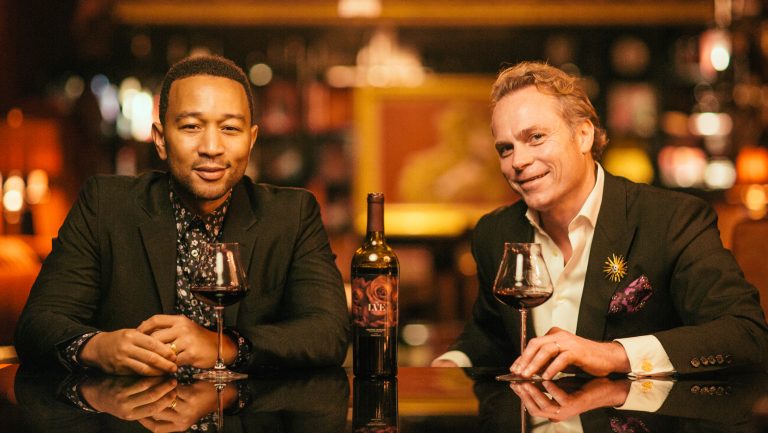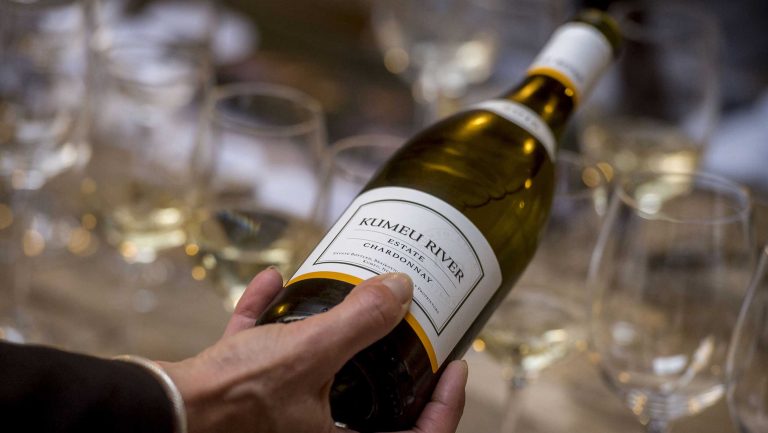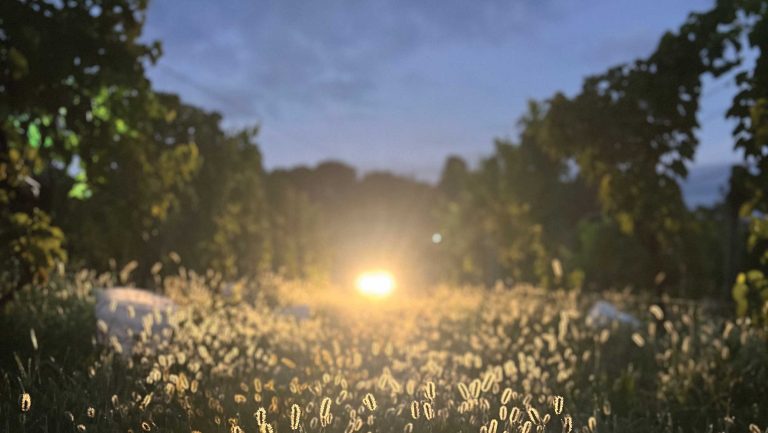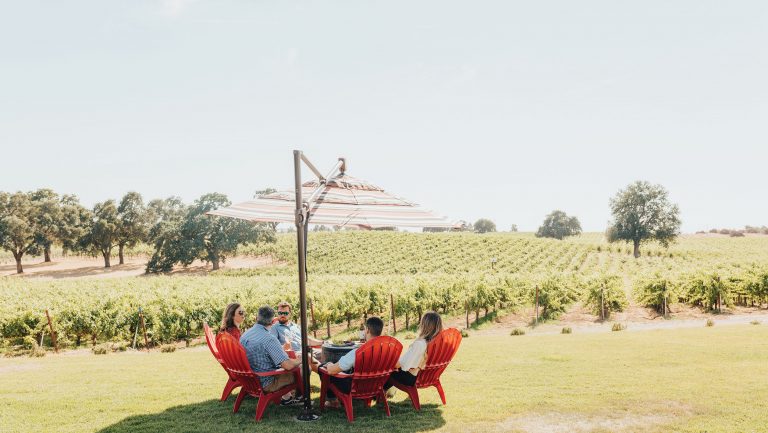A growing number of celebrities are getting into the wine business: Drew Barrymore has collaborated with Carmel Road in Soledad, California; Maynard James Keenan, the vocalist for the band Tool, is the proprietor of Caduceus Cellars in Jerome, Arizona; Sting bought the Il Palagio estate in Tuscany. Even sports stars like former NFL quarterback Drew Bledsoe have joined in. The question is, do celebrity wines sell—and if they do, who is buying them?
Where to Find Celebrity Wines
Mass-produced celebrity wines are commonly sold at big-box stores and grocery chains. For example, wines from Carmel Road and Dreaming Tree (a collaboration between Dave Matthews and winemaker Sean McKenzie, based in Geyserville, California) are regularly found on the shelves of retail outfits like Total Wine, BevMo!, and ABC Fine Wine and Spirits. Total Wine also carries wines from Caduceus Cellars and Pursued by Bear, the actor Kyle MacLachlan’s winery in Walla Walla, Washington. Esquin Wine and Spirits in Seattle carries wines from both Pursued by Bear and Doubleback, Bledsoe’s winery, also in Walla Walla, as well as other Washington celebrity wines. The Wine House in Los Angeles carries Dreaming Tree, Carmel Road, and Doubleback.
Devon Broglie, MS, the global beverage buyer for Whole Foods Market, says that Whole Foods carries several celebrity wine options that are popular with its customers, including Dreaming Tree and Carmel Road. “The popularity of several of these wines is evident in the number of bottles we sell,” he says, “but it’s difficult to determine if customers are drawn to these specific wines due to celebrity ties or simply because of the high quality of the product.” Of the celebrity wines the grocery offers, Miraval from Côtes de Provence is the most popular. Broglie says he doesn’t really consider it a celebrity wine, however, because although the estate is owned by Brad Pitt and Angelina Jolie, the wine is produced by the Perrin family of Château de Beaucastel.

Don’t miss the latest drinks industry news and insights. Sign up for our award-winning newsletters and get insider intel, resources, and trends delivered to your inbox every week.
Fame as a Sales Strategy
Some wine producers play up their celebrity association. At Carmel Road, the Barrymore wines’ labels feature the actress’s name. Chad Lapp, the vice president for Opici Family Distributing, which represents the musician John Legend’s LVE Collection Wines, explains that retailers and distributors actively promote LVE with point-of-sales and shelf talkers that indicate the wine is a collaboration between Legend and Jean-Charles Boisset, proprietor of Raymond Vineyards in Napa Valley, California. For them, combining the celebrity of John Legend with the expertise of an established wine personality makes a promising sales strategy.
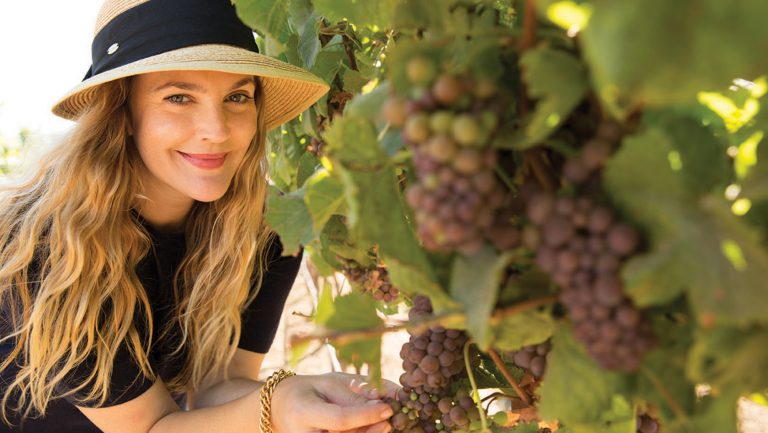
Other retailers and distributors, however, don’t count on fame to sell wine. Since the beginning, Miraval has avoided its celebrity connection wherever possible. “It was very important for us not to mention their names to introduce the wine, because that’s not what it’s about. It’s about the quality of the wine, not Brad and Angelina,” says Hubert Fabre, the executive vice president and national sales manager for Vineyard Brands, which represents Miraval. In fact, if retailers post a picture of Pitt and Jolie from, say, People magazine alongside their stores of Miraval, Vineyard Brands asks them to remove the clipping.
Despite attempts to downplay it, consumers and retailers quickly caught on to the Pitt-Jolie connection, and while it may have helped the brand overall, there were instances when the celebrity ownership also had the potential to hurt it. Fabre says that the fine-wine community seemed predisposed against Miraval because of its celebrity association. He recalled a blind tasting at which sommeliers, after the reveal, “were saying they wanted to not like the wine because it was owned by some celebrities,” but “the wine was nice—and they liked it.”
Sting’s association with the winery on the Tuscan estate he owns also tends to be downplayed in marketing efforts. For example, when Il Palagio’s Message in a Bottle, a blend of Sangiovese, Syrah, and Merlot, was featured in Esquin’s October 2017 Hot Sheet newsletter, it was the wine’s 91-point James Suckling rating that got the callout, not Sting.
Who Buys Celebrity Wines?
When a new celebrity wine hits the market, there are usually a lot of requests for it at Stew Leonard’s Wines & Spirits, which has stores in New York, New Jersey, and Connecticut, says Blake Leonard, a certified sommelier and marketing consultant for the company. This is how celebrity wines tend to make it onto Stew Leonard’s shelves, she says, explaining that because each of the stores is individually owned selections will vary. At the Norwalk, Connecticut, store, for example, Dreaming Tree, Carmel Road, Miraval, and Doubleback can all be found.
Lenny Rede, the marketing manager for Esquin, says that when he used to work at a wine retailer near the University of Washington campus, the store received a lot of requests for Dreaming Tree. At Esquin they still get some requests for the wine, but it’s not one they carry. Summer—concert season—is a popular time for those asks, he says. That may be in part because Matthews, a Seattle resident, and his band have played Washington’s Gorge Amphitheater every summer for 20 years—and Gorge concessioners poured Dreaming Tree.
Tool concerts have been shown to increase sales of Caduceus, even if just temporarily. In 2009, shortly after Jeff Sapara, now a sales consultant with VOS Selections, brought Caduceus to his former employer, distributor Martin Scott Wines, where he was a sales manager, Sapara witnessed the impact of concerts firsthand. Whenever Maynard James Keenan was performing or promoting his film Blood Into Wine in one of Martin Scott’s markets, the wines flew off the shelves. “He did a bottle signing at the Wine Library [in Springfield, New Jersey],” says Sapara, “and I think we went through 140 cases in one day. There were, like, 1,000 people on line the night before, waiting for him to sign a bottle. Then he would leave [town] and sales would go down. Then he’d come back and there’d be another big push.”
That fervor has mellowed in subsequent years, though. “We only see spikes during the touring cycle if there’s a specific large-scale pouring event,” says Keenan. Many Tool concerts feature a VIP experience, where guests can mingle and sip Caduceus wines before the show. Keenan often uses the opportunity to tell the story of Arizona wine country. Beyond that, he says, most sales spikes are in line with retail numbers for wine in general, with fall and winter holidays seeing the largest increases in sales. Since the wine’s first vintage—the 2004, which was released in 2006—sales of Caduceus have gone from roughly 300 cases a year to around 6,500 cases annually.
Jason Caballero, Advanced CMS, the lead sommelier at Bourbon Steak, a restaurant in Scottsdale, Arizona, gets only occasional requests for celebrity wines. “In the entire time I’ve been on the floor as a sommelier,” he says, “I’ve probably had two occasions where someone asked for Maynard’s wines specifically because they love Tool or Perfect Circle, and they didn’t really know much about the wines themselves.” He did once have a guest ask for Cabernet Sauvignon from Three Fat Guys—a winery founded by former NFL Green Bay Packers offensive linemen Daryn Colledge, Tony Moll, and Jason Spitz—although it turned out the guest was a former teammate from Colledge’s Arizona Cardinals days.
Still, Caballero does have a small handful of celebrity wines on the restaurant’s list. There’s a Doubleback, Inglenook Rubicon by Francis Ford Coppola, and a Caduceus Nagual de Marzo because, says Caballero, “it’s a good wine, but even more because it’s from Arizona.” Caballero emphasizes that the wines’ celebrity associations have no bearing on whether he brings them in. “I just happen to like these three,” he says, “so they have a place.”
Niche Markets
Washington State celebrity wines are easy sellers in their home market. Washington consumers tend to drink more premium Washington wine than they do premium wine from elsewhere, according to Nielsen and Chateau Ste. Michelle Wine Estates in Washington: Market share in the state is 47.4 percent for Washington premium wine. The Evergreen State is also home to four premium celebrity brands: Pursued by Bear; Doubleback; Nocking Point, by Stephen Amell, who plays the Green Arrow on the TV superhero drama Arrow; and Passing Time, by footballers Damon Huard and Joe Marino.
“We have lots of these footballer wines—Doubleback, Passing Time—and they sell really well,” says Esquin’s Rede. “Not only are they just good wines but they’re made by really good winemakers.” Chris Figgins, of Leonetti Cellar in Walla Walla, was Doubleback’s founding winemaker; Chris Peterson, of Avennia winery in Woodinville, makes Passing Time. While Esquin doesn’t sell celebrity wine for the sake of its celebrity, there can be a benefit to the celebrity angle. Says Rede, “I don’t know how many times I’ve [sold] signed bottles of Kyle’s wines because [customers] want to give them as a gift.”
Gift giving is a huge opportunity for selling celebrity wines, which may be why Keenan sees sales spike around the holidays. That’s the season when people will seek out specialty items for gifts. Take a celebrity wine and add fandom and you have a ready-made present for the person who has everything. Signed celebrity wines also make great additions for those putting together charity auction cases and packages. So when MacLachlan or Marino walks into the store, Rede has a stash of bottles on hand waiting to be signed.
Retailers and distributors say that while consumers do seek out celebrity wines, it’s quality that guarantees repeat sales. “If the wines are solid,” says Rede, “people will come back for more. If not, a fan will buy a bottle and then be done.”
Opici’s Lapp echoes this sentiment: “If you’re going to spend $70 for a Cabernet, you sure better get the quality you’re looking for or you’ll never go back,” he says. “The celebrity might help the one-time buy, but the quality is going to help the second buy.”

Dispatch
Sign up for our award-winning newsletter
Don’t miss the latest drinks industry news and insights—delivered to your inbox every week.
When she’s not writing about beverage, travel, or weird science, Julie H. Case can be found deep in America’s forests, foraging for mushrooms.

